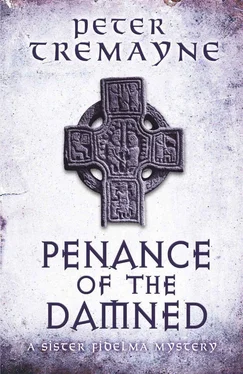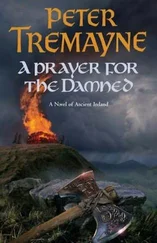Peter Tremayne - Penance of the Damned
Здесь есть возможность читать онлайн «Peter Tremayne - Penance of the Damned» весь текст электронной книги совершенно бесплатно (целиком полную версию без сокращений). В некоторых случаях можно слушать аудио, скачать через торрент в формате fb2 и присутствует краткое содержание. Год выпуска: 2016, Издательство: Headline, Жанр: Исторический детектив, на английском языке. Описание произведения, (предисловие) а так же отзывы посетителей доступны на портале библиотеки ЛибКат.
- Название:Penance of the Damned
- Автор:
- Издательство:Headline
- Жанр:
- Год:2016
- ISBN:нет данных
- Рейтинг книги:5 / 5. Голосов: 1
-
Избранное:Добавить в избранное
- Отзывы:
-
Ваша оценка:
- 100
- 1
- 2
- 3
- 4
- 5
Penance of the Damned: краткое содержание, описание и аннотация
Предлагаем к чтению аннотацию, описание, краткое содержание или предисловие (зависит от того, что написал сам автор книги «Penance of the Damned»). Если вы не нашли необходимую информацию о книге — напишите в комментариях, мы постараемся отыскать её.
Penance of the Damned — читать онлайн бесплатно полную книгу (весь текст) целиком
Ниже представлен текст книги, разбитый по страницам. Система сохранения места последней прочитанной страницы, позволяет с удобством читать онлайн бесплатно книгу «Penance of the Damned», без необходимости каждый раз заново искать на чём Вы остановились. Поставьте закладку, и сможете в любой момент перейти на страницу, на которой закончили чтение.
Интервал:
Закладка:
Conri’s expression was one of resignation. ‘When I said the “greater threat”, I meant it. You know our diverging history, lady. The Eoghanacht of Cashel and the Ui Fidgente do not always see the world from the same mountain top.’
‘We have recently concluded a peace between us – an amicable peace – and have re-entered a community of spirit in one ancient kingdom,’ she reminded him.
‘Except that such a matter as this may well turn into another crossroads where our paths may once more diverge.’
‘That they must not do,’ Fidelma said.
‘I’ll put it bluntly, lady,’ returned Conri. ‘Our clergy knows your brother vehemently opposes the growing influence of these Pententials. That is the very reason why Abbot Nannid is demanding these ecclesiastical punishments.’
‘But Abbot Segdae was a foremost advocate for keeping to our native laws. He would never have condoned the use of these Penitentials to replace the laws of our kingdom!’
‘That is not Abbot Nannid’s logic,’ Conri said. ‘The situation is thus: Prince Donennach finds himself sitting on a knife-edge. You, above all people, will know just how fragile is the peace between our people. A word out of place, a jibe, a threat – and all may be blown away like a house of straw. If Donennach defies his clergy he may face another attempt to oust him as ruler of the Ui Fidgente or, at best, face an internal war among us. If he accepts the demands of Abbot Nannid, then he risks war with Cashel and even retribution from the High King. Either way, there will be bloodshed.’
Fidelma’s mouth tightened at his words. ‘I am well aware of what is at stake here,’ she said. ‘Abbot Nannid doubtless still chafes at being rebuked for the conspiracy we discovered at his Abbey of Mungairit, even though he was not directly involved.’
‘He may well feel resentment, but proving that is his sole purpose in demanding the death of Gorman would be difficult. Even before this happened he has spoken out in support of these new rules of the Faith.’
‘It might be difficult to demonstrate any personal vengeance in him but he certainly would not be squeamish about applying the new rules of punishment on one he sees as an enemy, if it furthers his cause.’
‘There is also a whisper among Abbot Nannid’s followers that Abbot Segdae’s successor, at Imleach may not be too rigorous a supporter of the old laws,’ Conri added.
‘Have you met the Prior of Imleach?’
‘I have. I suppose you would describe him as a scholarly man of middling years. He does not appear to be a strong man, either physically or in personality. Frankly, he did not make much of an impression on me. But then, who am I to judge?’
‘I wondered if you had discovered anything about his background. He is newly appointed to office and I do not know him,’ Fidelma explained.
Conri shook his head. ‘Like you, lady, I know little of him and you will have to judge for yourself. Doubtless you will meet him tonight as the prince expects everyone to attend the traditional welcome feast. You have accommodation in the personal guestrooms of the prince as befits your rank.’
‘Where is the delegation from Imleach accommodated then?’
‘They are in a guest-house within the fortress grounds. It was where the murder took place.’
‘And Abbot Nannid and his party?’
‘Abbot Nannid has decided to quarter himself in the Abbey of Nechta.’
‘Where is that?’ Fidelma had not heard of such an abbey before.
Conri actually smiled. ‘There was a small religious community in the township. It was part of the township but is now enclosed behind newly erected walls. Abbey Nannid has used his authority to call it an abbey.’
Fidelma let out a long breath. ‘Often, Conri, I feel that life is just one long game of fidchell in which we are forced to move our pieces on the boardgame of life – not as we would wish to, but only as is dictated to us by the events.’
‘That may well be, lady. But you must admit that there is only one important event which dictates this particular game.’
‘The murder of Abbot Segdae?’
‘Indeed. However we come to that event, come to it we must,’ the warlord said solemnly.
They rode on in silence, crossing a few hills before coming into more gently sloping lands, descending towards the river plain. There were cultivated fields with crops of barley not quite ripe for harvesting next to fenced fields in which rusty red and white cows were grazing – long-backed ‘bald cows’ as they were called because of the distinctive mound on the head. Such cows did not grow horns like other breeds. Conri noticed her looking at them.
‘That’s part of Prince Donennach’s own herd,’ he told her. ‘Good for beef as well as milking.’
They skirted an area of stony ground, identified by Conri as An Clocher, the Place of Stone. On some of the heights Fidelma could glimpse the dark figures of sentinels keeping watch on the approaches to the fortress. The road led over a small rise and below them lay the river’s bend, along which the principal trading settlement of the Ui Fidgente stretched. Dominating all, set atop a prominent hill above the river, stood Dun Eochair Mhaigh – the Fortress at the Bend of the River.
Once again, Fidelma found herself thinking, as she had when she had first seen it, that the fortress of Prince Donennach of the Ui Fidgente was surprisingly small and drab for a ruler who claimed an ancestry greater and richer than the Eoghanacht. There was nothing particularly awe-inspiring about the dreary, grey stone stronghold towering above the eastern bank of the river. Fidelma had seen better hill forts raised by local chieftains guarding many small farming communities. However, the buildings were spread in fairly extensive grounds and fortifications.
On the previous occasion of her visit with Eadulf, they had approached the fortress from the western bank and crossed over by a newly constructed wooden bridge. The township, which lay before the main gates, had been busy then as it was now. Many boats were moored along the River Maigh. The township was a trading centre for the merchants who plied their boats along the river. The waters rose in the hills to the south then pushed their way northwards, passing the Ford of the Oaks where they became tidal yet continued to drive on towards the great sea inlet not far from the Abbey of Mungairit.
Now, approaching from the east, the party followed the path down the hill into the sprawl of buildings surrounding the market square. The banks of the river were edged with wooden quays a-throng with wagons filled with produce brought by the river vessels. These would eventually be driven to other inland settlements. There were several blacksmiths at work; the stables were full and business was good. The township was crowded but, if Fidelma’s memory was correct, not unduly so. Most people did not give them a second glance although one or two – and she noticed that these were mainly in the robes of religious – did halt and stare at them as they rode by.
What caught her particular attention was the newly constructed wooden walls erected along the southern side of the market square – almost as if in confrontation with the fortress on the hill opposite. She frowned. The last time they were in this township, this area had just consisted of a number of homesteads built close to the local chapel.
The inhabitants of these homesteads were all devoted followers of the New Faith and had formed their own small community. These men and women, with their children, worked at their own trades but supported the chapel that was regarded as their centre. The area had once been an integral part of the township itself, but now, as Conri had said, they were separated by walls rising to the height of two tall men standing upon each other’s shoulders.
Читать дальшеИнтервал:
Закладка:
Похожие книги на «Penance of the Damned»
Представляем Вашему вниманию похожие книги на «Penance of the Damned» списком для выбора. Мы отобрали схожую по названию и смыслу литературу в надежде предоставить читателям больше вариантов отыскать новые, интересные, ещё непрочитанные произведения.
Обсуждение, отзывы о книге «Penance of the Damned» и просто собственные мнения читателей. Оставьте ваши комментарии, напишите, что Вы думаете о произведении, его смысле или главных героях. Укажите что конкретно понравилось, а что нет, и почему Вы так считаете.












